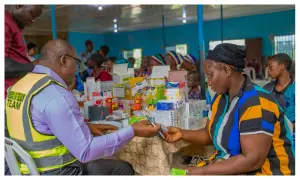A medical doctor, Dr. Iyayi Osifo, has revealed that some individuals possess a rare genetic mutation that provides natural resistance to HIV infection, allowing them to remain uninfected even after exposure to the virus.
In a social media post shared on Tuesday, Dr. Osifo explained the scientific basis for this phenomenon, which has sparked significant interest in the medical community and among the general public.
According to Dr. Osifo, this resistance occurs due to a mutation affecting the CCR5 receptor in white blood cells, which normally serves as an entry point for HIV to infect cells. Individuals with this mutation do not express the CCR5 receptor, making it difficult for HIV to establish infection in their bodies.
"People do not know that there are some people who have resistance to HIV," Dr. Osifo stated. "While this gene exists mostly in Northern Europe, some studies have also found that they exist in some Nigerian, Ghanaian, and Kenyan populations, but it is not in significant frequencies."
The doctor emphasized that despite this natural protection in some individuals, it should not be viewed as justification for engaging in risky behaviors. He stressed the importance of knowing one's HIV status and taking appropriate preventive measures to maintain overall good health.
Modern Treatment Offers Hope
Dr. Osifo highlighted the significant advancements in HIV treatment, noting that with modern antiretroviral therapy, individuals living with HIV can lead normal lives with greatly improved outcomes.
"Now the good thing about HIV is this, if you contract HIV especially if you contract it in your 30s or 40s, and you take your medications very seriously, you are more likely to live a natural normal life and die of other causes than die of HIV infection," he explained.
The medical expert emphasized that early diagnosis and consistent treatment are key factors in managing the virus and preventing its progression to AIDS. He urged everyone to know their HIV status, as early detection leads to better treatment outcomes.
This revelation comes at a time when Nigeria continues to grapple with HIV prevalence across different regions. Recent reports indicate that Northern Nigeria accounts for nearly half of national HIV cases, while states like Rivers, Benue, and Akwa Ibom have recorded high numbers of cases.
Health authorities continue to advocate for increased awareness, testing, and access to treatment as part of comprehensive efforts to combat HIV in Nigeria and across Africa.













